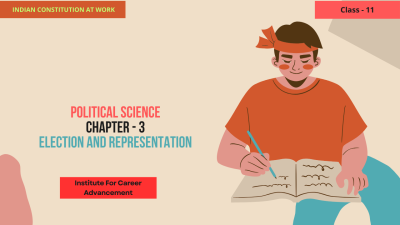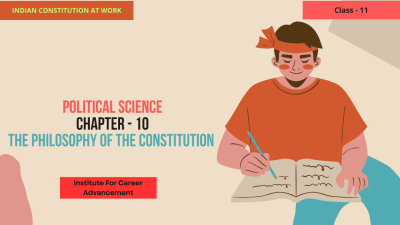Course description
The chapter on the Legislature in Class 11 Political Science provides an in-depth understanding of the legislative branch of the government, its structure, functions, powers, and its role in a democratic system.
1. Introduction to the Legislature
The Legislature is the branch of government responsible for making laws, controlling public spending, and representing the interests of the people. In a democratic system, it ensures that laws are made with the participation of elected representatives.
2. Bicameral and Unicameral Legislatures
The chapter introduces the two types of legislatures:
Unicameral Legislature: A single legislative chamber, used in many state legislatures in India and in countries like New Zealand.
Bicameral Legislature: A legislature with two houses, such as the Lok Sabha and Rajya Sabha at the national level in India. The importance of this system in balancing representation and preventing hasty decision-making is discussed.
3. Parliamentary System of India
India follows a parliamentary system, where the executive is drawn from and accountable to the legislature. The chapter focuses on the roles of the two houses of the Indian Parliament:
Lok Sabha (House of the People): The directly elected lower house, which represents the citizens of the country.
Rajya Sabha (Council of States): The indirectly elected upper house, which represents the states and union territories.
4. Composition of the Lok Sabha and Rajya Sabha
The chapter covers the composition, size, and election processes of both houses:
Lok Sabha members are directly elected by the people through general elections.
Rajya Sabha members are elected by the elected members of the State Legislative Assemblies and by the President for nominated members.
5. Functions of the Legislature
Lawmaking: The primary function of the legislature is to make laws for the country. This includes drafting, debating, and passing bills.
Deliberation and Debate: The legislature acts as a platform for discussing public issues, policies, and national concerns.
Representation: Legislators represent the interests and aspirations of the people.
Control over the Executive: Through parliamentary procedures like question hour, debates, and motions, the legislature exercises control over the actions of the executive.
Budget Approval: The legislature has the power to approve the government’s budget, ensuring public funds are spent appropriately.
Constituent Functions: Amending the Constitution is a key function of the legislature.
6. Law-Making Process
The chapter explains the detailed process of how a bill becomes a law in India, moving through various stages:
Introduction of the Bill: Bills can be introduced in either house (except Money Bills, which must be introduced in the Lok Sabha).
Committee Stage: Bills are often referred to committees for detailed examination.
Debate and Voting: The bill is debated, and members vote on its provisions.
Approval from Both Houses: A bill must be passed by both the Lok Sabha and Rajya Sabha.
Presidential Assent: After being passed by both houses, the bill is sent to the President for approval. Once the President gives assent, the bill becomes law.
7. Types of Bills
Ordinary Bills: Can be introduced in either house and deal with general matters.
Money Bills: Relate to taxation or government spending and must be introduced in the Lok Sabha.
Constitutional Amendment Bills: Aim to amend provisions of the Constitution and require a special majority for passage.
8. Powers and Functions of the Indian Parliament
The chapter highlights the various powers and functions of the Indian Parliament:
Legislative Powers: Parliament has the authority to make laws on subjects in the Union and Concurrent Lists.
Financial Powers: Parliament controls public finances, including passing the budget and Money Bills.
Judicial Powers: Parliament can impeach the President, remove judges of the Supreme Court and High Courts, and take action against its own members for breach of privilege.
Electoral Functions: Parliament participates in the election of the President and Vice-President.
Executive Oversight: Through mechanisms like question hour, zero hour, and no-confidence motions, Parliament ensures that the executive remains accountable.
9. Committees in Parliament
Parliamentary Committees play a crucial role in ensuring the detailed examination of bills, the budget, and government policies. The chapter explains the importance of these committees in legislative functioning:
Standing Committees: Permanent committees that deal with particular areas like finance, defense, and external affairs.
Ad Hoc Committees: Temporary committees set up for specific purposes.
10. State Legislatures
The chapter also covers the structure and functioning of the State Legislatures. Most states in India have a unicameral legislature (only the Legislative Assembly), while some have a bicameral system (Legislative Assembly and Legislative Council).
একাদশ শ্রেণীর রাষ্ট্রবিজ্ঞানে আইন প্রণয়ন সংক্রান্ত অধ্যায়টি সরকারের আইন প্রণয়ন শাখা, এর কাঠামো, কার্যাবলী, ক্ষমতা এবং গণতান্ত্রিক ব্যবস্থায় এর ভূমিকা সম্পর্কে গভীর ধারণা প্রদান করে।
1টি। আইনসভার সঙ্গে পরিচয়
আইন প্রণয়ন, সরকারি ব্যয় নিয়ন্ত্রণ এবং জনগণের স্বার্থের প্রতিনিধিত্ব করার জন্য দায়বদ্ধ সরকারের শাখা হল আইনসভা। একটি গণতান্ত্রিক ব্যবস্থায়, এটি নিশ্চিত করে যে নির্বাচিত প্রতিনিধিদের অংশগ্রহণে আইন তৈরি করা হয়।
2. দ্বিকক্ষবিশিষ্ট ও এককক্ষবিশিষ্ট আইনসভা
এই অধ্যায়ে দুই ধরনের আইনসভার পরিচয় দেওয়া হয়েছেঃ
এককক্ষবিশিষ্ট আইনসভাঃ একটি একক আইনসভা, যা ভারতের অনেক রাজ্য আইনসভায় এবং নিউজিল্যান্ডের মতো দেশে ব্যবহৃত হয়।
দ্বিকক্ষবিশিষ্ট আইনসভাঃ ভারতে জাতীয় পর্যায়ে লোকসভা ও রাজ্যসভার মতো দুটি কক্ষ সহ একটি আইনসভা। প্রতিনিধিত্বের ভারসাম্য বজায় রাখতে এবং তাড়াহুড়ো করে সিদ্ধান্ত নেওয়া প্রতিরোধে এই ব্যবস্থার গুরুত্ব নিয়ে আলোচনা করা হয়েছে।
3. ভারতের সংসদীয় ব্যবস্থা
ভারত একটি সংসদীয় ব্যবস্থা অনুসরণ করে, যেখানে কার্যনির্বাহী আইনসভার কাছে দায়বদ্ধ। এই অধ্যায়টি ভারতীয় সংসদের দুটি কক্ষের ভূমিকার উপর দৃষ্টি নিবদ্ধ করেঃ
লোকসভা (জনগণের সদন) সরাসরি নির্বাচিত নিম্নকক্ষ, যা দেশের নাগরিকদের প্রতিনিধিত্ব করে।
রাজ্যসভা (রাজ্য পরিষদ) পরোক্ষভাবে নির্বাচিত উচ্চকক্ষ, যা রাজ্য ও কেন্দ্রশাসিত অঞ্চলগুলির প্রতিনিধিত্ব করে।
4. লোকসভা ও রাজ্যসভার গঠন
অধ্যায়টিতে উভয় কক্ষের গঠন, আকার এবং নির্বাচন প্রক্রিয়া অন্তর্ভুক্ত রয়েছেঃ
লোকসভার সদস্যরা সাধারণ নির্বাচনের মাধ্যমে জনগণের দ্বারা সরাসরি নির্বাচিত হন।
রাজ্যসভার সদস্যরা রাজ্য বিধানসভার নির্বাচিত সদস্যদের দ্বারা এবং মনোনীত সদস্যদের জন্য রাষ্ট্রপতি দ্বারা নির্বাচিত হন।
5. আইনসভার কার্যাবলী
আইন প্রণয়নঃ আইনসভার প্রাথমিক কাজ হল দেশের জন্য আইন তৈরি করা। এর মধ্যে রয়েছে খসড়া প্রণয়ন, বিতর্ক এবং বিল পাস করা।
আলোচনা ও বিতর্কঃ আইনসভা জনসাধারণের সমস্যা, নীতি এবং জাতীয় উদ্বেগ নিয়ে আলোচনার জন্য একটি মঞ্চ হিসাবে কাজ করে।
প্রতিনিধিত্বঃ আইন প্রণেতারা জনগণের স্বার্থ ও আকাঙ্ক্ষার প্রতিনিধিত্ব করেন।
কার্যনির্বাহীর উপর নিয়ন্ত্রণঃ প্রশ্নোত্তরের সময়, বিতর্ক এবং প্রস্তাবের মতো সংসদীয় পদ্ধতির মাধ্যমে আইনসভা কার্যনির্বাহীর ক্রিয়াকলাপের উপর নিয়ন্ত্রণ প্রয়োগ করে।
বাজেট অনুমোদনঃ আইনসভার সরকারের বাজেট অনুমোদনের ক্ষমতা রয়েছে, যাতে জনসাধারণের তহবিল যথাযথভাবে ব্যয় করা হয়।
গঠনমূলক কার্যাবলীঃ সংবিধান সংশোধন আইনসভার একটি প্রধান কাজ।
6টি। আইন প্রণয়ন প্রক্রিয়া
এই অধ্যায়টি বিভিন্ন পর্যায়ের মধ্য দিয়ে কীভাবে একটি বিল ভারতে আইনে পরিণত হয় তার বিশদ প্রক্রিয়া ব্যাখ্যা করেঃ
বিলের উপস্থাপনাঃ যে কোনও বাড়িতে বিল প্রবর্তন করা যেতে পারে। (except Money Bills, which must be introduced in the Lok Sabha).
কমিটির পর্যায়ঃ বিলগুলি প্রায়শই বিস্তারিত পরীক্ষার জন্য কমিটির কাছে পাঠানো হয়।
বিতর্ক এবং ভোটদানঃ বিলটি নিয়ে বিতর্ক হয় এবং সদস্যরা এর বিধানগুলির উপর ভোট দেন।
উভয় কক্ষ থেকে অনুমোদনঃ একটি বিল লোকসভা এবং রাজ্যসভা উভয়ের দ্বারা পাস করতে হবে।
রাষ্ট্রপতির অনুমোদনঃ উভয় সভায় পাস হওয়ার পর বিলটি অনুমোদনের জন্য রাষ্ট্রপতির কাছে পাঠানো হয়। রাষ্ট্রপতি অনুমোদন দিলে বিলটি আইনে পরিণত হয়।
7. বিলের প্রকার
সাধারণ বিলঃ যে কোনও সভায় পেশ করা যেতে পারে এবং সাধারণ বিষয়গুলি নিয়ে কাজ করা যেতে পারে।
অর্থ বিলঃ কর বা সরকারি ব্যয়ের সঙ্গে সম্পর্কিত এবং তা অবশ্যই লোকসভায় পেশ করতে হবে।
সাংবিধানিক সংশোধনী বিলঃ সংবিধানের বিধানগুলি সংশোধন করার লক্ষ্য এবং পাসের জন্য বিশেষ সংখ্যাগরিষ্ঠতার প্রয়োজন।
8. ভারতীয় সংসদের ক্ষমতা ও কার্যাবলী
এই অধ্যায়ে ভারতীয় সংসদের বিভিন্ন ক্ষমতা ও কার্যাবলী তুলে ধরা হয়েছেঃ আইন প্রণয়নের ক্ষমতাঃ ইউনিয়ন এবং সমবর্তী তালিকার বিষয়গুলিতে আইন প্রণয়নের ক্ষমতা সংসদের রয়েছে।
আর্থিক ক্ষমতাঃ সংসদ বাজেট এবং অর্থ বিল পাস সহ জনসাধারণের আর্থিক নিয়ন্ত্রণ করে।
বিচার বিভাগীয় ক্ষমতাঃ সংসদ রাষ্ট্রপতিকে ইমপিচ করতে পারে, সুপ্রিম কোর্ট ও হাইকোর্টের বিচারকদের অপসারণ করতে পারে এবং বিশেষাধিকার লঙ্ঘনের জন্য তার নিজের সদস্যদের বিরুদ্ধে ব্যবস্থা নিতে পারে।
নির্বাচনী কার্যাবলীঃ রাষ্ট্রপতি ও উপরাষ্ট্রপতি নির্বাচনে সংসদ অংশগ্রহণ করে।
নির্বাহী তত্ত্বাবধানঃ প্রশ্নোত্তরের সময়, শূন্য সময় এবং অনাস্থা প্রস্তাবের মতো ব্যবস্থার মাধ্যমে সংসদ নিশ্চিত করে যে কার্যনির্বাহী দায়বদ্ধ থাকবে।
9টি। সংসদে কমিটি
বিল, বাজেট এবং সরকারি নীতিগুলির বিশদ পরীক্ষা নিশ্চিত করতে সংসদীয় কমিটিগুলি গুরুত্বপূর্ণ ভূমিকা পালন করে। এই অধ্যায়টি আইন প্রণয়নে এই কমিটিগুলির গুরুত্ব ব্যাখ্যা করেঃ
স্থায়ী কমিটিঃ স্থায়ী কমিটি যা অর্থ, প্রতিরক্ষা এবং বৈদেশিক বিষয়গুলির মতো নির্দিষ্ট ক্ষেত্রগুলি নিয়ে কাজ করে।
অস্থায়ী কমিটিঃ নির্দিষ্ট উদ্দেশ্যে অস্থায়ী কমিটি গঠন করা হয়।
10। রাজ্য আইনসভাগুলি
এই অধ্যায়ে রাজ্য আইনসভাগুলির কাঠামো এবং কার্যকারিতাও অন্তর্ভুক্ত রয়েছে। ভারতের বেশিরভাগ রাজ্যে এককক্ষবিশিষ্ট আইনসভা (শুধুমাত্র বিধানসভা) রয়েছে, আবার কিছু রাজ্যে দ্বিকক্ষবিশিষ্ট ব্যবস্থা রয়েছে। (Legislative Assembly and Legislative Council).



















